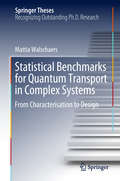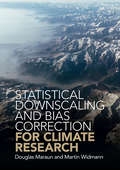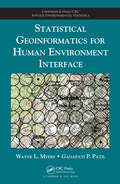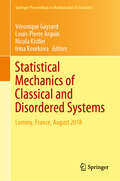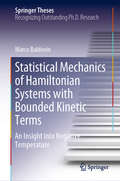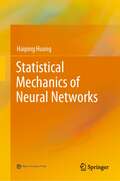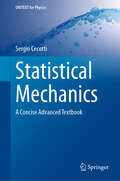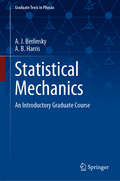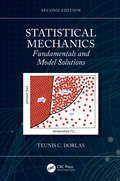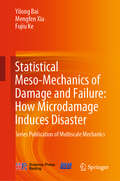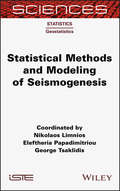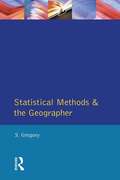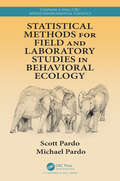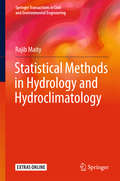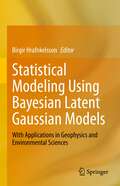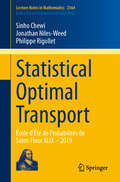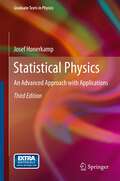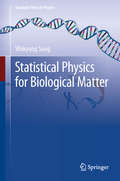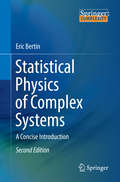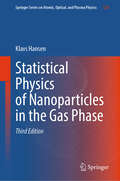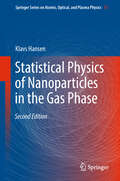- Table View
- List View
Statistical Benchmarks for Quantum Transport in Complex Systems: From Characterisation To Design (Springer Theses)
by Mattia WalschaersThis book introduces a variety of statistical tools for characterising and designing the dynamical features of complex quantum systems. These tools are applied in the contexts of energy transfer in photosynthesis, and boson sampling. In dynamical quantum systems, complexity typically manifests itself via the interference of a rapidly growing number of paths that connect the initial and final states. The book presents the language of graphs and networks, providing a useful framework to discuss such scenarios and explore the rich phenomenology of transport phenomena. As the complexity increases, deterministic approaches rapidly become intractable, which leaves statistics as a viable alternative.
Statistical Data Analysis for the Physical Sciences
by Adrian BevanData analysis lies at the heart of every experimental science. Providing a modern introduction to statistics, this book is ideal for undergraduates in physics. It introduces the necessary tools required to analyse data from experiments across a range of areas, making it a valuable resource for students. In addition to covering the basic topics, the book also takes in advanced and modern subjects, such as neural networks, decision trees, fitting techniques, and issues concerning limit or interval setting. Worked examples and case studies illustrate the techniques presented, and end-of-chapter exercises help test the reader's understanding of the material.
Statistical Downscaling and Bias Correction for Climate Research
by Douglas Maraun Martin WidmannStatistical downscaling and bias correction are becoming standard tools in climate impact studies. This book provides a comprehensive reference to widely-used approaches, and additionally covers the relevant user context and technical background, as well as a synthesis and guidelines for practitioners. It presents the main approaches including statistical downscaling, bias correction and weather generators, along with their underlying assumptions, skill and limitations. Relevant background information on user needs and observational and climate model uncertainties is complemented by concise introductions to the most important concepts in statistical and dynamical modelling. A substantial part is dedicated to the evaluation of regional climate projections and their value in different user contexts. Detailed guidelines for the application of downscaling and the use of downscaled information in practice complete the volume. Its modular approach makes the book accessible for developers and practitioners, graduate students and experienced researchers, as well as impact modellers and decision makers.
Statistical Geoinformatics for Human Environment Interface (Chapman & Hall/CRC Applied Environmental Statistics)
by Wayne L. Myers Ganapati P. PatilStatistical Geoinformatics for Human Environment Interface presents two paradigms for studying both space and interface with regard to human/environment: localization and multiple indicators. The first approach localizes thematic targets by treating space as a pattern of vicinities, with the pattern being a square grid and the placement of viciniti
Statistical Mechanics of Classical and Disordered Systems: Luminy, France, August 2018 (Springer Proceedings in Mathematics & Statistics #293)
by Véronique Gayrard Nicola Kistler Louis-Pierre Arguin Irina KourkovaThese proceedings of the conference Advances in Statistical Mechanics, held in Marseille, France, August 2018, focus on fundamental issues of equilibrium and non-equilibrium dynamics for classical mechanical systems, as well as on open problems in statistical mechanics related to probability, mathematical physics, computer science, and biology. Statistical mechanics, as envisioned more than a century ago by Boltzmann, Maxwell and Gibbs, has recently undergone stunning twists and developments which have turned this old discipline into one of the most active areas of truly interdisciplinary and cutting-edge research. The contributions to this volume, with their rather unique blend of rigorous mathematics and applications, outline the state-of-the-art of this success story in key subject areas of equilibrium and non-equilibrium classical and quantum statistical mechanics of both disordered and non-disordered systems. Aimed at researchers in the broad field of applied modern probability theory, this book, and in particular the review articles, will also be of interest to graduate students looking for a gentle introduction to active topics of current research.
Statistical Mechanics of Hamiltonian Systems with Bounded Kinetic Terms: An Insight into Negative Temperature (Springer Theses)
by Marco BaldovinRecent experimental evidence about the possibility of "absolute negative temperature" states in physical systems has triggered a stimulating debate about the consistency of such a concept from the point of view of Statistical Mechanics. It is not clear whether the usual results of this field can be safely extended to negative-temperature states; some authors even propose fundamental modifications to the Statistical Mechanics formalism, starting with the very definition of entropy, in order to avoid the occurrence of negative values of the temperature tout-court.The research presented in this thesis aims to shed some light on this controversial topic. To this end, a particular class of Hamiltonian systems with bounded kinetic terms, which can assume negative temperature, is extensively studied, both analytically and numerically. Equilibrium and out-of-equilibrium properties of this kind of system are investigated, reinforcing the overall picture that the introduction of negative temperature does not lead to any contradiction or paradox.
Statistical Mechanics of Neural Networks
by Haiping HuangThis book highlights a comprehensive introduction to the fundamental statistical mechanics underneath the inner workings of neural networks. The book discusses in details important concepts and techniques including the cavity method, the mean-field theory, replica techniques, the Nishimori condition, variational methods, the dynamical mean-field theory, unsupervised learning, associative memory models, perceptron models, the chaos theory of recurrent neural networks, and eigen-spectrums of neural networks, walking new learners through the theories and must-have skillsets to understand and use neural networks. The book focuses on quantitative frameworks of neural network models where the underlying mechanisms can be precisely isolated by physics of mathematical beauty and theoretical predictions. It is a good reference for students, researchers, and practitioners in the area of neural networks.
Statistical Mechanics: A Concise Advanced Textbook (UNITEXT for Physics)
by Sergio CecottiThis textbook is based on lecture notes that the author delivered at Qiuzhen College (Tsinghua University), a Chinese institution known for its exceptionally talented mathematics students. The book's intended audience shapes its character. It introduces Statistical Mechanics from the ground up, offering a fully self-contained presentation that aims for mathematical precision. It distinguishes rigorous results from controlled approximations and provides physical insights into phenomena. Despite its concise nature (suited for a one-semester basic course), this book covers several topics typically not found in introductory texts. These include Shannon's information-theoretic interpretation of entropy, the gauge approach to order-disorder duality in the Ising model, the Yang-Lee theory, and the quantum dissipation-fluctuation theorem. Additionally, it explores frustrated and quenched systems, including an introduction to the celebrated Parisi solution of the Sherrington-Kirkpatrick model of spin glasses. The path integral formalism is extensively discussed from various perspectives to suit different applications. Chapter 2 approaches path integrals through the Feynman-Kac formula and second quantization. In Chapter 5, they are examined within the context of effective field theories like Landau-Ginzburg theory, while Chapter 6 delves into their connection with Brownian motion, Langevin stochastic differential equations, and Fokker-Planck diffusion PDEs. The book also explores the relationship between stochastic processes and supersymmetry. Various techniques for computing path integrals, especially functional determinants, are introduced throughout the relevant chapters, offering the most suitable computational tools for each application.
Statistical Mechanics: An Introductory Graduate Course (Graduate Texts in Physics)
by A. J. Berlinsky A. B. HarrisIn a comprehensive treatment of Statistical Mechanics from thermodynamics through the renormalization group, this book serves as the core text for a full-year graduate course in statistical mechanics at either the Masters or Ph.D. level. Each chapter contains numerous exercises, and several chapters treat special topics which can be used as the basis for student projects. The concept of scaling is introduced early and used extensively throughout the text. At the heart of the book is an extensive treatment of mean field theory, from the simplest decoupling approach, through the density matrix formalism, to self-consistent classical and quantum field theory as well as exact solutions on the Cayley tree. Proceeding beyond mean field theory, the book discusses exact mappings involving Potts models, percolation, self-avoiding walks and quenched randomness, connecting various athermal and thermal models. Computational methods such as series expansions and Monte Carlo simulations are discussed, along with exact solutions to the 1D quantum and 2D classical Ising models. The renormalization group formalism is developed, starting from real-space RG and proceeding through a detailed treatment of Wilson’s epsilon expansion. Finally the subject of Kosterlitz-Thouless systems is introduced from a historical perspective and then treated by methods due to Anderson, Kosterlitz, Thouless and Young. Altogether, this comprehensive, up-to-date, and engaging text offers an ideal package for advanced undergraduate or graduate courses or for use in self study.
Statistical Mechanics: Fundamentals and Model Solutions
by Teunis C DorlasStatistical Mechanics: Fundamentals and Model Solutions, Second Edition Fully updated throughout and with new chapters on the Mayer expansion for classical gases and on cluster expansion for lattice models, this new edition of Statistical Mechanics: Fundamentals and Model Solutions provides a comprehensive introduction to equilibrium statistical mechanics for advanced undergraduate and graduate students of mathematics and physics. The author presents a fresh approach to the subject, setting out the basic assumptions clearly and emphasizing the importance of the thermodynamic limit and the role of convexity. With problems and solutions, the book clearly explains the role of models for physical systems, and discusses and solves various models. An understanding of these models is of increasing importance as they have proved to have applications in many areas of mathematics and physics. Features Updated throughout with new content from the field An established and well-loved textbook Contains new problems and solutions for further learning opportunity Author Professor Teunis C. Dorlas is at the Dublin Institute for Advanced Studies, Ireland.
Statistical Meso-Mechanics of Damage and Failure: Series Publication of Multiscale Mechanics
by Yilong Bai Mengfen Xia Fujiu KeThis book introduces a trans-scale framework necessary for the physical understanding of breakdown behaviors and presents some new paradigm to clarify the mechanisms underlying the trans-scale processes. The book, which is based on the interaction of mechanics and statistical physics, will help to deepen the understanding of how microdamage induces disaster and benefit the forecasting of the occurrence of catastrophic rupture. It offers notes and problems in each part as interesting background and illustrative exercises.Readers of the book would be graduate students, researchers, engineers working on civil, mechanical and geo-engineering, etc. However, people with various background but interested in disaster reduction and forecasting, like applied physics, geophysics, seismology, etc., may also be interested in the book.
Statistical Methods and Modeling of Seismogenesis
by Nikolaos Limnios Eleftheria Papadimitriou George TsaklidisThe study of earthquakes is a multidisciplinary field, an amalgam of geodynamics, mathematics, engineering and more. The overriding commonality between them all is the presence of natural randomness. Stochastic studies (probability, stochastic processes and statistics) can be of different types, for example, the black box approach (one state), the white box approach (multi-state), the simulation of different aspects, and so on. This book has the advantage of bringing together a group of international authors, known for their earthquake-specific approaches, to cover a wide array of these myriad aspects. A variety of topics are presented, including statistical nonparametric and parametric methods, a multi-state system approach, earthquake simulators, post-seismic activity models, time series Markov models with regression, scaling properties and multifractal approaches, selfcorrecting models, the linked stress release model, Markovian arrival models, Poisson-based detection techniques, change point detection techniques on seismicity models, and, finally, semi-Markov models for earthquake forecasting.
Statistical Methods and the Geographer
by S GregoryFirst published in 1978. Routledge is an imprint of Taylor & Francis, an informa company.
Statistical Methods for Climate Scientists
by Timothy DelSole Michael TippettA comprehensive introduction to the most commonly used statistical methods relevant in atmospheric, oceanic and climate sciences. Each method is described step-by-step using plain language, and illustrated with concrete examples, with relevant statistical and scientific concepts explained as needed. Particular attention is paid to nuances and pitfalls, with sufficient detail to enable the reader to write relevant code. Topics covered include hypothesis testing, time series analysis, linear regression, data assimilation, extreme value analysis, Principal Component Analysis, Canonical Correlation Analysis, Predictable Component Analysis, and Covariance Discriminant Analysis. The specific statistical challenges that arise in climate applications are also discussed, including model selection problems associated with Canonical Correlation Analysis, Predictable Component Analysis, and Covariance Discriminant Analysis. Requiring no previous background in statistics, this is a highly accessible textbook and reference for students and early-career researchers in the climate sciences.
Statistical Methods for Field and Laboratory Studies in Behavioral Ecology (Chapman & Hall/CRC Applied Environmental Statistics)
by Scott Pardo Michael PardoStatistical Methods for Field and Laboratory Studies in Behavioral Ecology focuses on how statistical methods may be used to make sense of behavioral ecology and other data. It presents fundamental concepts in statistical inference and intermediate topics such as multiple least squares regression and ANOVA. The objective is to teach students to recognize situations where various statistical methods should be used, understand the strengths and limitations of the methods, and to show how they are implemented in R code. Examples are based on research described in the literature of behavioral ecology, with data sets and analysis code provided. Features: This intermediate to advanced statistical methods text was written with the behavioral ecologist in mind Computer programs are provided, written in the R language. Datasets are also provided, mostly based, at least to some degree, on real studies. Methods and ideas discussed include multiple regression and ANOVA, logistic and Poisson regression, machine learning and model identification, time-to-event modeling, time series and stochastic modeling, game-theoretic modeling, multivariate methods, study design/sample size, and what to do when things go wrong. It is assumed that the reader has already had exposure to statistics through a first introductory course at least, and also has sufficient knowledge of R. However, some introductory material is included to aid the less initiated reader. Scott Pardo, Ph.D., is an accredited professional statistician (PStat®) by the American Statistical Association. Michael Pardo is a Ph.D. is a candidate in behavioral ecology at Cornell University, specializing in animal communication and social behavior.
Statistical Methods in Hydrology and Hydroclimatology (Springer Transactions in Civil and Environmental Engineering)
by Rajib MaityThis book focuses on the application of statistical methods in the field of hydrology and hydroclimatology. Among the latest theories being used in these fields, the book introduces the theory of copulas and its applications in this context. The purpose is to develop an understanding and illustrate the usefulness of the statistical techniques with detailed theory and numerous worked out examples. Apart from this, MATLAB-based codes and solutions of some worked out examples are also provided to assist the readers to handle real life data. This book presents a comprehensive knowledge of statistical techniques combining the basics of probability and the current advances in stochastic hydrology. Besides serving as a textbook for graduate courses on stochastic modeling in hydrology and related disciplines, the book offers valuable resources for researchers and professionals involved in the field of hydrology and climatology.
Statistical Modeling Using Bayesian Latent Gaussian Models: With Applications in Geophysics and Environmental Sciences
by Birgir HrafnkelssonThis book focuses on the statistical modeling of geophysical and environmental data using Bayesian latent Gaussian models. The structure of these models is described in a thorough introductory chapter, which explains how to construct prior densities for the model parameters, how to infer the parameters using Bayesian computation, and how to use the models to make predictions. The remaining six chapters focus on the application of Bayesian latent Gaussian models to real examples in glaciology, hydrology, engineering seismology, seismology, meteorology and climatology. These examples include: spatial predictions of surface mass balance; the estimation of Antarctica’s contribution to sea-level rise; the estimation of rating curves for the projection of water level to discharge; ground motion models for strong motion; spatial modeling of earthquake magnitudes; weather forecasting based on numerical model forecasts; and extreme value analysis of precipitation on a high-dimensional grid. The book is aimed at graduate students and experts in statistics, geophysics, environmental sciences, engineering, and related fields.
Statistical Optimal Transport: École d'Été de Probabilités de Saint-Flour XLIX – 2019 (Lecture Notes in Mathematics #2364)
by Sinho Chewi Jonathan Niles-Weed Philippe RigolletThis monograph aims to offer a concise introduction to optimal transport, quickly transitioning to its applications in statistics and machine learning. It is primarily tailored for students and researchers in these fields, yet it remains accessible to a broader audience of applied mathematicians and computer scientists. Each chapter is complemented with exercises for the reader to test their understanding. As such, this monograph is suitable for a graduate course on the topic of statistical optimal transport.
Statistical Physics
by Josef HonerkampThe application of statistical methods to physics is essential. This unique book on statistical physics offers an advanced approach with numerous applications to the modern problems students are confronted with. Therefore the text contains more concepts and methods in statistics than the student would need for statistical mechanics alone. Methods from mathematical statistics and stochastics for the analysis of data are discussed as well. The book is divided into two parts, focusing first on the modeling of statistical systems and then on the analysis of these systems. Problems with hints for solution help the students to deepen their knowledge. The third edition has been updated and enlarged with new sections deepening the knowledge about data analysis. Moreover, a customized set of problems with solutions is accessible on the Web at extras. springer. com.
Statistical Physics
by Nicolas Sator Nicolas Pavloff Lenaic CouedelThis book presents an introduction to the main concepts of statistical physics, followed by applications to specific problems and more advanced concepts, selected for their pedagogical or practical interest. Particular attention has been devoted to the presentation of the fundamental aspects, including the foundations of statistical physics, as well as to the discussion of important physical examples. Comparison of theoretical results with the relevant experimental data (with illustrative curves) is present through the entire textbook. This aspect is facilitated by the broad range of phenomena pertaining to statistical physics, providing example issues from domains as varied as the physics of classical and quantum liquids, condensed matter, liquid crystals, magnetic systems, astrophysics, atomic and molecular physics, superconductivity and many more. This textbook is intended for graduate students (MSc and PhD) and for those teaching introductory or advanced courses on statistical physics. Key Features: A rigorous and educational approach of statistical physics illustrated with concrete examples. A clear presentation of fundamental aspects of statistical physics. Many exercises with detailed solutions. Nicolas Sator is Associate Professor at Sorbonne University, Paris, France. He is a member of the Laboratory of Theoretical Physics of Condensed Matter (LPTMC) and his research focuses on the physics of liquids. Nicolas Pavloff is Professor at Paris-Saclay University, France. He is a member of Laboratoire de Physique Théorique et Modèles Statistiques (LPTMS) and his domain of research is quantum fluid theory. Lénaïc Couëdel is Professor at the University of Sasktchewan, Saskatoon, Canada and researcher at CNRS, France. His research area is plasma physics with a focus on complex plasma crystals.
Statistical Physics for Biological Matter (Graduate Texts in Physics)
by Wokyung SungThis book aims to cover a broad range of topics in statistical physics, including statistical mechanics (equilibrium and non-equilibrium), soft matter and fluid physics, for applications to biological phenomena at both cellular and macromolecular levels. It is intended to be a graduate level textbook, but can also be addressed to the interested senior level undergraduate. The book is written also for those involved in research on biological systems or soft matter based on physics, particularly on statistical physics.Typical statistical physics courses cover ideal gases (classical and quantum) and interacting units of simple structures. In contrast, even simple biological fluids are solutions of macromolecules, the structures of which are very complex. The goal of this book to fill this wide gap by providing appropriate content as well as by explaining the theoretical method that typifies good modeling, namely, the method of coarse-grained descriptions that extract the most salient features emerging at mesoscopic scales. The major topics covered in this book include thermodynamics, equilibrium statistical mechanics, soft matter physics of polymers and membranes, non-equilibrium statistical physics covering stochastic processes, transport phenomena and hydrodynamics. Generic methods and theories are described with detailed derivations, followed by applications and examples in biology. The book aims to help the readers build, systematically and coherently through basic principles, their own understanding of nonspecific concepts and theoretical methods, which they may be able to apply to a broader class of biological problems.
Statistical Physics of Complex Systems
by Eric BertinThis course-tested primer provides graduate students and non-specialists with a basic understanding of the concepts and methods of statistical physics and demonstrates their wide range of applications to interdisciplinary topics in the field of complex system sciences, including selected aspects of theoretical modeling in biology and the social sciences. Generally speaking, the goals of statistical physics may be summarized as follows: on the one hand to study systems composed of a large number of interacting units, and on the other to predict the macroscopic, collective behavior of the system considered from the perspective of the microscopic laws governing the dynamics of the individual entities. These two goals are essentially also shared by what is now called 'complex systems science,' and as such, systems studied in the framework of statistical physics may be considered to be among the simplest examples of complex systems - while also offering a rather well developed mathematical treatment. The second edition has been significantly revised and expanded, featuring in particular three new chapters addressing non-conserved particles, evolutionary population dynamics, networks, properties of both individual and coupled simple dynamical systems, and convergence theorems, as well as short appendices that offer helpful hints on how to perform simple stochastic simulations in practice. Yet, the original spirit of the book - to remain accessible to a broad, non-specialized readership - has been kept throughout: the format is a set of concise, modular and self-contained topical chapters, avoiding technicalities and jargon as much as possible, and complemented by a wealth of worked-out examples, so as to make this work useful as a self-study text or as textbook for short courses. From the reviews of the first edition: ". . . a good introduction to basic concepts of statistical physics and complex systems for students and researchers with an interest in complex systems in other fields . . . . " Georg Hebermehl, Zentralblatt MATH, Vol. 1237, 2012 ". . . this short text remains very refreshing for the mathematician. " Dimitri Petritis, Mathematical Reviews, Issue 2012k
Statistical Physics of Fields
by Mehran KardarWhile many scientists are familiar with fractals, fewer are familiar with scale-invariance and universality which underly the ubiquity of their shapes. These properties may emerge from the collective behaviour of simple fundamental constituents, and are studied using statistical field theories. Initial chapters connect the particulate perspective developed in the companion volume, to the coarse grained statistical fields studied here. Based on lectures taught by Professor Kardar at MIT, this textbook demonstrates how such theories are formulated and studied. Perturbation theory, exact solutions, renormalization groups, and other tools are employed to demonstrate the emergence of scale invariance and universality, and the non-equilibrium dynamics of interfaces and directed paths in random media are discussed. Ideal for advanced graduate courses in statistical physics, it contains an integrated set of problems, with solutions to selected problems at the end of the book and a complete set available to lecturers at www. cambridge. org/9780521873413.
Statistical Physics of Nanoparticles in the Gas Phase (Springer Series on Atomic, Optical, and Plasma Physics #128)
by Klavs HansenThe book develops the tools to describe equilibrium thermal properties and near-equilibrium processes of finite size particles, with the emphasis on gas phase particles. Numerous examples illustrate the theory. The text offers recipes for solving commonly encountered problems arising in the description of nanophase gas particles. Each chapter contains exercises spanning from easy to advance and four appendices provide additional useful information.This revised and updated third edition provides the reader with new sections, a new chapter on kinetic energy distributions, a new appendix on probability distributions and a wealth of exercises.
Statistical Physics of Nanoparticles in the Gas Phase (Springer Series on Atomic, Optical, and Plasma Physics #73)
by Klavs HansenThermal processes are ubiquitous and an understanding of thermal phenomena is essential for a complete description of the physics of nanoparticles, both for the purpose of modeling the dynamics of the particles and for the correct interpretation of experimental data.The second edition of this book follows the logic of first edition, with an emphasis on presentation of literature results and to guide the reader through derivations. Several topics have been added to the repertoire, notably magnetism, a fuller exposition of aggregation and the related area of nucleation theory. Also a new chapter has been added on the transient hot electron phenomenon. The book remains focused on the fundamental properties of nanosystems in the gas phase. Each chapter is enriched with additional new exercises and three Appendices provide additional useful material.
